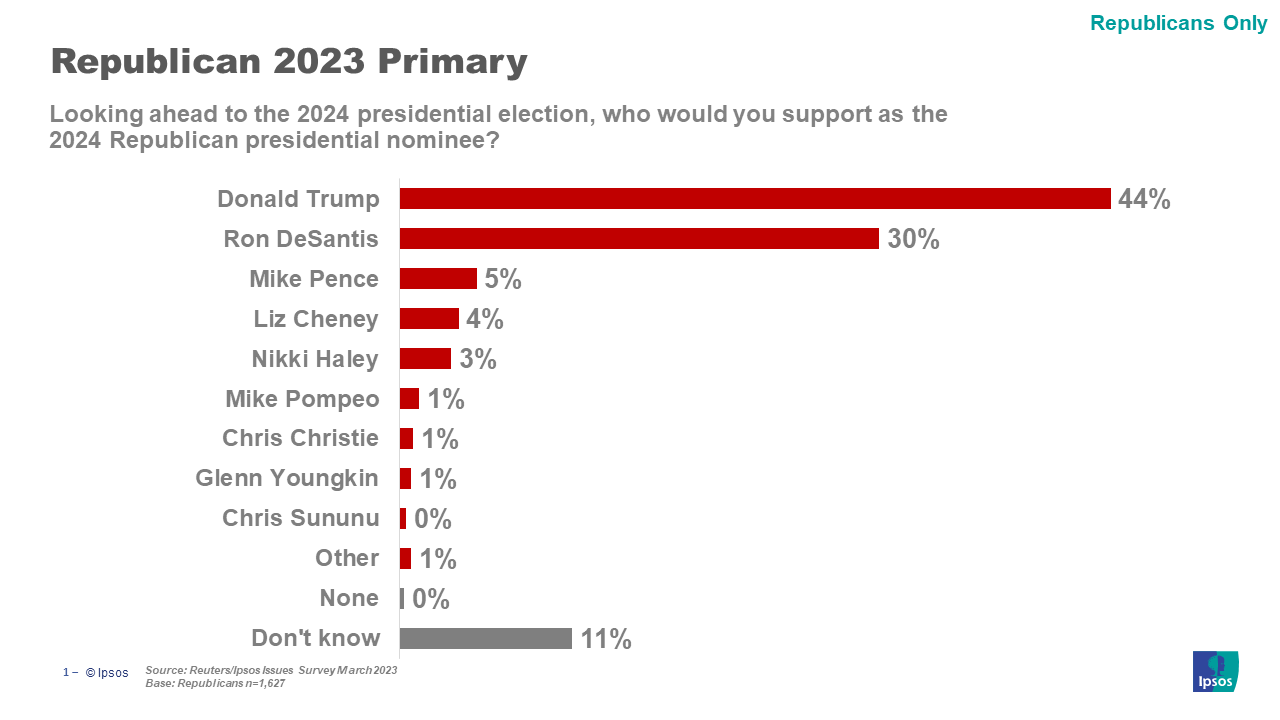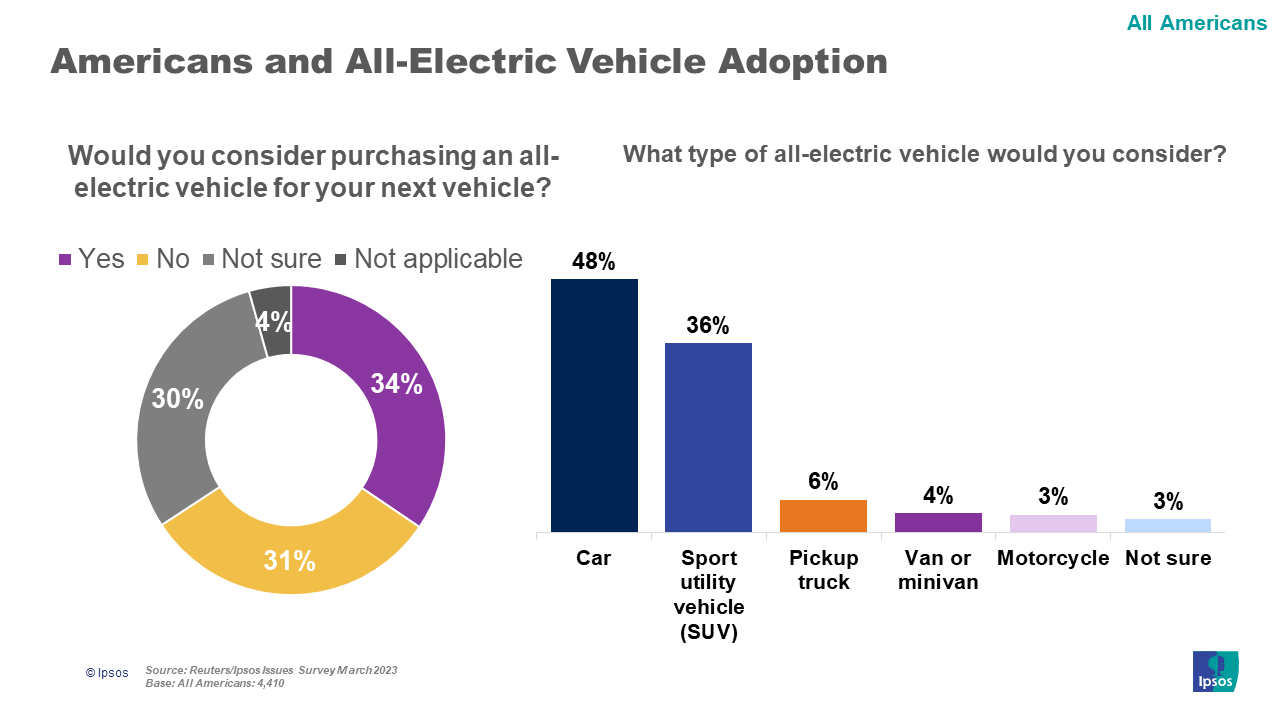Reuters/Ipsos Issues Survey March 2023
Washington, DC, March 24, 2023– The March 2023 Reuters/Ipsos Issues Survey examines a variety of topics. For the 2024 presidential election, the survey shows that Donald Trump continues to lead the Republican primary field, with Ron DeSantis dragging behind by double digits. For social and political issues, just under half of Americans say gun ownership should have strong regulations or restrictions. A large percentage of Americans are concerned about the federal deficit, and majorities report that they would like to solve the problem by increasing taxes on the highest earners rather than cut spending on programs that help the poor and elderly. The survey also shows about one-third of Americans are interested in purchasing all-electric vehicles.
Detailed Findings: 2024 Presidential Election Primary
Former President Donald Trump leads the Republican primary field, receiving 44% of Republican support followed by Florida Governor Ron DeSantis (30%). Former South Carolina Governor Nikki Haley garners 3% of the vote share. Looking at the general election, among registered voters, President Joe Biden (41%) and Ron DeSantis (39%) are tied in the race for the White House, while in a head-to-head against Donald Trump (37%), Biden (42%) has a slight edge. In a three-way race, between Biden (41%), DeSantis (27%), and Trump (18%), Biden garners the most popular support, while Trump is the spoiler. Two-thirds of registered voters (66%) say Donald Trump should not run for president in 2024, and a similar number say Biden (67%) should not run. Registered voters also report they are less likely to vote for a candidate who supports laws that ban or severely restrict abortion access (65%) or who supports policies that ban books in schools and school libraries on subject matter like the Holocaust, Jim Crow laws, and white supremacy in the United States (81%). Registered voters are more likely to support a presidential candidate who supports increasing police funding to fight crime (80%), supports allowing teachers to discuss system racism at school (57%), and who supports building a border wall between the U.S. and Mexico (54%).

Detailed Findings: Cultural and Political Issues
When looking at cultural and political issues, 48% of Americans say that gun ownership should have strong regulations or restrictions, while just 6% of Americans say gun ownership should have no or very few restrictions, while 40% of Americans say gun ownership should have basic or moderate regulations. Looking at issues in schools, of a majority of Americans agree that parents should have oversight on books that are taught in school (65%), but just 30% support banning books controversial books from public school libraries. Americans are evenly split on supporting laws requiring laws requiring faculty and staff at K-12 schools only use the pronouns of a student's biological sex at birth, not their gender identity (42% support and 42% oppose). Americans are more likely to oppose (40%) laws that ban university-level affirmative action programs than support (35%), but 25% report being unsure on this issue. A narrow majority of Americans oppose laws allowing government money to send students to private and religious schools, even if it reduces money for public schools (51%).

Detailed Findings: Debt Ceiling and Federal Deficit
Turning to the debt ceiling and the federal deficit, about half of Americans (46%) report having seen, read or heard a fair amount or more about the debt ceiling debate in Congress. Thirty-two percent of Americans favor raising the debt ceiling, while 37% oppose it and 32% are unsure. Three-quarters of Americans are concerned about the federal budget deficit, and to deal with the issue, 69% report that if they had to choose, they would increase taxes on the highest earners and corporations, while 19% would cut spending to programs for the poor and elderly, and 12% would prefer if nothing were done because they do not believe it is a real issue.

Detailed Findings: Electric Vehicles
One in three Americans report they would consider an all-electric vehicle for their next vehicle (34%), while 31% would not and 30% were unsure. The most commonly considered all-electric vehicle is a car (48%) followed by a sport utility vehicle (36%).
About the Study
These are some of the findings of an Ipsos poll conducted between March 14-20, 2023 on behalf of Thomson Reuters. For this survey, a sample of 4,410 adults age 18+ from the continental U.S., Alaska, and Hawaii was interviewed online in English. The sample also includes 2,111 Democrats, 1,627 Republicans, and 448 independents.
The sample was randomly drawn from Ipsos’ online panel, partner online panel sources, and “river” sampling and does not rely on a population frame in the traditional sense. Ipsos uses fixed sample targets, unique to each study, in drawing a sample. After a sample has been obtained from the Ipsos panel, Ipsos calibrates respondent characteristics to be representative of the U.S. Population using standard procedures such as raking-ratio adjustments. The source of these population targets is U.S. Census 2022 American Community Survey data. The sample drawn for this study reflects fixed sample targets on demographics. Post hoc weights were made to the population characteristics on gender, age, race/ethnicity, region, and education.
Statistical margins of error are not applicable to online non-probability polls. All sample surveys and polls may be subject to other sources of error, including but not limited to coverage error and measurement error. Where figures do not sum to 100, this is due to the effects of rounding. The precision of Ipsos online polls is measured using a credibility interval. In this case, the poll has a credibility interval of plus or minus 1.8 percentage points for all respondents. Ipsos calculates a design effect (DEFF) for each study based on the variation of the weights, following the formula of Kish (1965). This study had a credibility interval adjusted for design effect of the following (n=4,408, DEFF=1.5, adjusted Confidence Interval=+/-3.3 percentage points).
The poll also has a credibility interval of plus or minus 2.6 percentage points for Democrats, plus or minus 3.0 percentage points for Republicans, and plus or minus 5.7 percentage points for independents.
For more information on this news release, please contact:
Chris Jackson
Senior Vice President, US
Public Affairs
+1 202 420-2025
[email protected]
Annaleise Lohr
Director, US
Public Affairs
[email protected]
About Ipsos
Ipsos is one of the largest market research and polling companies globally, operating in 90 markets and employing over 18,000 people.
Our passionately curious research professionals, analysts and scientists have built unique multi-specialist capabilities that provide true understanding and powerful insights into the actions, opinions and motivations of citizens, consumers, patients, customers or employees. Our 75 solutions are based on primary data from our surveys, social media monitoring, and qualitative or observational techniques.
Founded in France in 1975, Ipsos is listed on the Euronext Paris since July 1st, 1999. The company is part of the SBF 120 and the Mid-60 index and is eligible for the Deferred Settlement Service (SRD).
ISIN code FR0000073298, Reuters ISOS.PA, Bloomberg IPS:
FP www.ipsos.com




